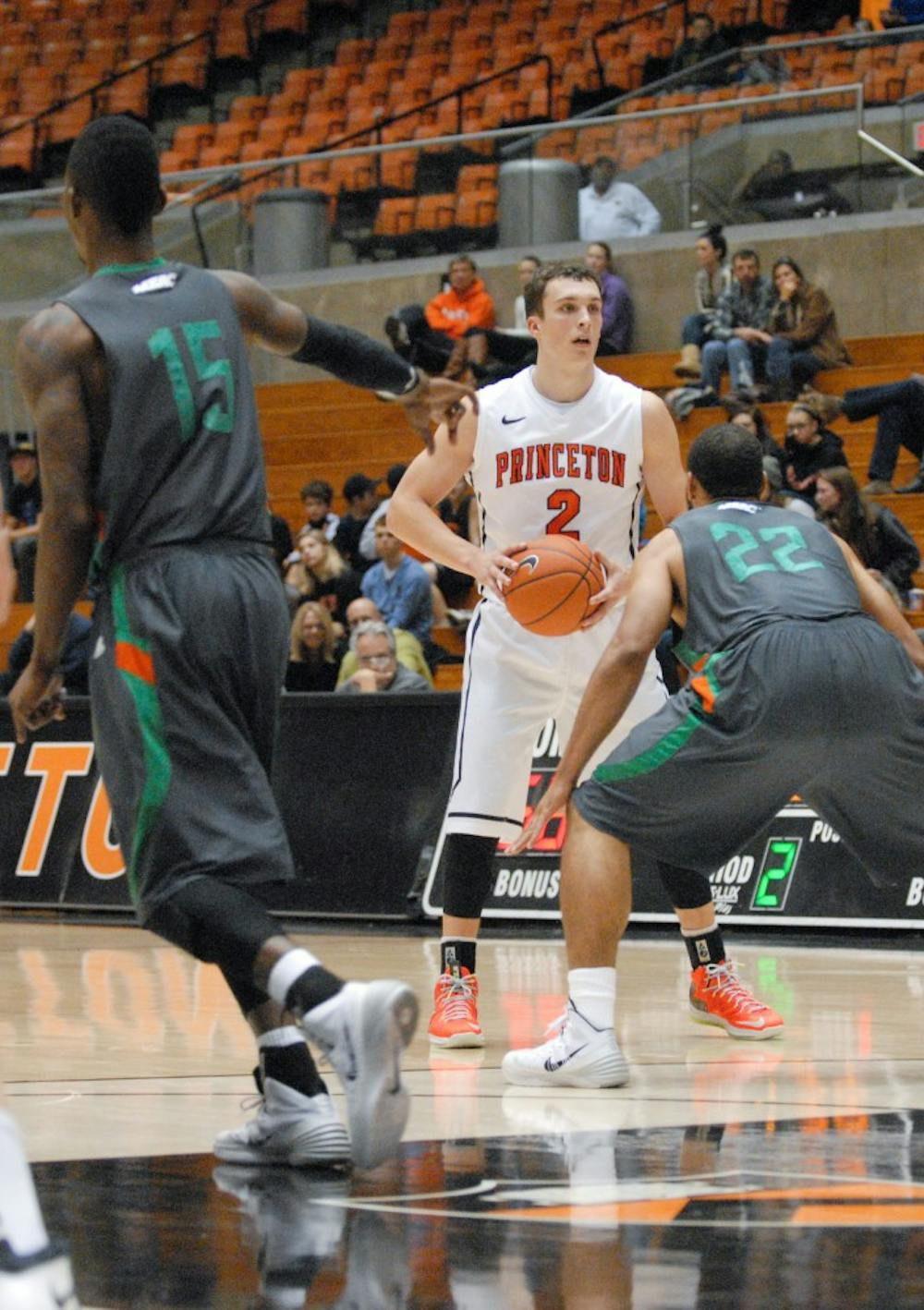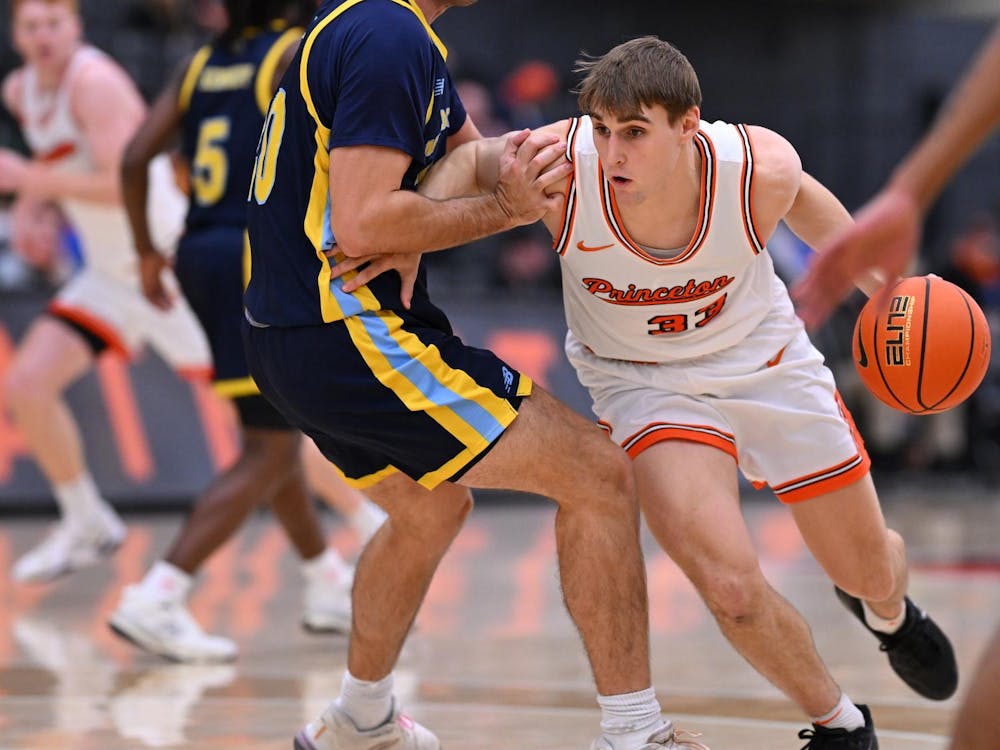The Ivy League saw a power shift this past weekend as Princeton suffered a pair of major losses on the road at Harvard and Dartmouth. After two weeks of conference play, here’s how the Ancient Eight stack up:
1. Harvard (17-3 overall, 4-0 Ivy League): Reigning league champions for three years running, the Crimson is off to a hot start in pursuit of a fourpeat. On average it has outscored opponents by 11.5 points per game. Guard Wesley Saunders, a first team all-Ivy selection last year, dropped a monstrous 24 points on 13 shots against Princeton. The most complete squad of the Ivies, it will look to move toward a title and NCAA tournament berth in this weekend’s home matchups against Brown and Yale.
2. Brown (11-7, 3-1): This defensively strong team leads the league in rebounding and sports a talented guard in Steven Speith. Speith won the past weekend’s Rookie of the Week honors thanks in part to a lights-out shooting performance against Cornell (5-5 FG, 8-9 FT). The Bears split their series against Yale and comfortably overcame Cornell and Columbia, but will face their biggest challenge yet this Friday against the red hot Crimson in Cambridge.
3. Yale (9-9, 3-1): Forward Justin Sears headlines an offense which ranks next to last in the league in scoring. The co-player of the week put up 22 points and managed eight rebounds against Columbia. Having won all three of their home games, the Bulldogs will go on the road to face Dartmouth and Harvard.
4. Dartmouth (9-9, 2-2): Historically lurking at the bottom of the conference table, the Big Green injected some life into the program with a pair of home wins over Penn and Princeton. Co-player of the week forward John Golden managed 15 and 19 points against the Quakers and Tigers, respectively. He and his team will try to continue the impressive home stand this weekend against Yale and Brown, but will face an uphill battle against two strong teams.
5. Columbia (13-8, 2-2): The Lions boast the league’s second-best average scoring margin and entered last weekend with a six-game winning streak. In Morningside Heights’ Levien Gymnasium, Columbia has managed to keep opponents scoring totals down and limit shooting efficiency. However, as shown in the past weekend’s losses at Yale and Brown, the team’s high shot efficiency may not be enough to contend with the league’s best.
6. Princeton (12-5, 0-3): Despite a trio of disappointing Ivy League outings, there is still plenty of time left for the Tigers to make positive strides. Sophomore forward Hans Brase remains one of the league’s best offensive forwards. Senior guard TJ Bray has also managed to keep up his high level of scoring efficiency. However, the offense — a prolific unit earlier in the season — was unable to overcome deficits in close games at Penn, Harvard and Dartmouth. These three contests revealed a need for a defensive regrouping, if the Orange and Black hope to find themselves near the top of the table by season’s end. A total collapse by Harvard would also be helpful.
7. University of Pennsylvania (4-13, 1-2): The Quakers lost big this past weekend at Dartmouth and Harvard. Despite their upset of a heavily favored Princeton team, it is unlikely that this Penn team has the talent to hang with the league’s best teams. They have managed to lead the league in assists with 15.5 per game.

8. Cornell (1-17, 0-4): Four consecutive Ivy League losses were not at all what the Big Red needed, having only beaten Division III Oberlin College this season. Statistics place it near or at the bottom of the league in nearly every category. It is unlikely the team will pose much of a threat to any Ivy opponent this season.
Ivy League women’s basketball is off to an exciting start, with tough competition and parity at the top of the table. Here’s a look at the eight squads so far:
1. Harvard (13-5 overall, 3-1 Ivy League): The Crimson women won their first three Ivy contests and boast the league’s highest scoring offense. Impressively, they managed to beat Princeton in Jadwin Gymnasium for the first time since the 2008-2009 season. This offense, however, only managed 38 points to Penn’s 67 this past weekend, connecting on 13-71 shots. They will look to return to form this weekend at Brown and Yale.
2. Penn (12-5, 2-1): The Penn defense has been positively stifling this season. In the Quakers’ past three contests, they have allowed an average of 46.3 points per game. Through 17 games they have the country’s 22ndbest scoring defense. Additionally, both of this past weekend’s co-players of the week were Quakers. Forward Alyssa Baron and center Sydney Stipanovich averaged 15.5 and 13.5 points per game in home matchups against Dartmouth and Harvard.

3. Princeton (11-6, 2-1): This Princeton team will have to deal with strong competition if it looks to earn its fifth consecutive league championship. Junior guard Blake Dietrick continues to shoot with some of the highest efficiency in the country. They will travel to face New York rivals Columbia and Cornell, teams that the Tigers managed to comfortably sweep last year. Sophomore forward Alex Wheatley notched 16 and 11 points against Harvard and Dartmouth, good for Ivy League Honor Roll.
4. Cornell (11-7, 3-1): The Big Red women have fared far better than their male counterparts this season. They are currently riding a three game winning streak, having overcome Columbia, Brown and Yale. Guard Shelby Lyman managed 24 points last Friday at the helm of the second highest in-league scoring offense. Penn and Princeton will travel to Ithaca this upcoming weekend.
5. Yale (9-9, 3-1): Among the Ivies, the Bulldogs are tied for second-worst in field goal shooting percentage and demonstrate inconsistent offensive efficiency overall. They suffered their first Ivy loss away against Cornell, which has been strong at home. The Yale scoring defense sits around the middle of the league with 65.4 points allowed per game.
6. Brown (7-11, 1-3): Team captain and guard Lauren Clarke currently leads all Ivy women in scoring with 17.1 points per game. Fellow guard Sophie Bikofsky leads the league in three-point shooting. However, in both losses to Yale the offense failed to top 60 points.
7. Columbia (4-14, 1-3): Other than an impressive 71-64 home win against Cornell in their Ivy League opener, wins have been hard to come by for the Lions. Their field goal, three-point and free throw percentages are all among the worst in the league. The past two seasons have seen Columbia at the bottom of the league table. Offensive efficiency will have to dramatically improve if the squad looks to change that.
8. Dartmouth (3-15, 0-4): The Big Green is in the midst of a four-game losing streak against Ivy opponents. In matchups at Harvard, Penn and Princeton, the offense failed to top 60 points. These offensive woes make it the lowest scoring team in the league. It will look to get back on track this weekend against Yale and Brown.








